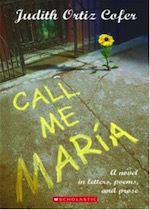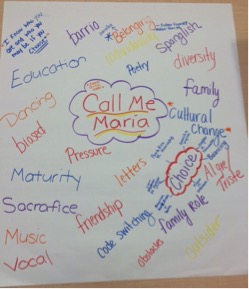by Andrea García, Brooke Bendernagel, and Lindsey Brooks, Hofstra University.
 |
Confessions of a Non-Native Speaker A poem by María Alegre I confess, Excerpt from Call Me María by Judith Ortiz Cofer (2004, p. 125). |
This week’s global exploration takes us into the narrative world of Judith Ortiz Cofer and her novel Call Me María (2004). Oritz Cofer, originally from Puerto Rico but raised in New Jersey, writes stories that help shape our understanding of the Puerto Rican diaspora experience. Her work blends together different genres, like poems, personal essays, and prose to compose stories she describes as being “creative non-fiction.” She perceives “recollections and memories being partly fiction.” Ortiz Cofer explains, “By calling [my stories] creative non-fiction, by introducing the word ‘creative,’ I am admitting, so that there is no confusion, that what I am trying to do is non-fiction in intent, that these events actually happened, but that the way I am transmitting them to the reader may be a recreation” (Ocasio, 1994, p. 735)
In Call Me María, we meet 15-year-old María, an inquisitive young girl with a gift for writing who is negotiating what it means to live in between two worlds, Puerto Rico and New York, while navigating her way through languages and identities. The everyday experiences of living in el barrio take center stage through Ortiz Coffer’s use of poems, letters, and prose. I selected this book as part of the text set on Global Explorations in verse for my graduate course in children’s literature. This week, Brooke and Lindsey share their personal response to this story, as well as their insights about using this novel in the elementary classroom to foster intercultural understandings.
Brooke’s response to the novel explores the way language is used in the story. She writes, “Something that I appreciated about the book was how the author incorporated Spanish. Even though the book was primarily written in English, there were certain words, sayings and quotes where Judith Ortiz Cofer chose to write in Spanish. There were many instances where I had to keep my phone next to me, so that I could translate the Spanish to English in order to understand the point being made. I thought that this was actually a key aspect of the novel because it made you connect more with the characters and actually put you in there shoes. The confusion, frustration and curiosity are some things that I was able to then relate to language wise.”
For Lindsey, her personal response to the novel centered on the difficult choices María had to face throughout the story, and the new understandings Lindsey gained from María’s experiences. “Unlike María,” Lindsey writes, “I was born and raised in New York. I never had to uproot my life and begin over somewhere else. After reading this novel, I believe that María was put into very difficult and compromising situations. She not only had to make choices that would affect her future, she had to make mature choices that affected her entire family.”
Lindsey chose to delve deeper into the implications of the initial conflict in the story: “When presented with the choice to move with her father to New York or stay with her mother in Puerto Rico, María was forced to decide between the two most important people in her life… Although I felt María handled the situation unbelievably, I was still able to see the sadness that she felt as she missed her mother and the place she was born.”
 During their discussion of the book in class, Lindsey and Brooke chose to use a Graffiti Board to document their initial wonderings on the story. They identified a number of key issues for them as readers, and then went back to identify the themes they wanted to discuss further in their literature discussion. Cultural change, choice, and belonging, emerged as three relevant issues they selected to discuss further. They both spoke and wrote about Maria’s mature presence in the story. Lindsey summed it up like this, “I enjoyed this novel, and I can see how many other people may be able to relate to Maria’s life. She is a very strong character and it is very admirable to read about how she handled a challenging situation that determined her life’s path.” Brooke describes her transactions with the story as a whole indicating that, “By the end of the story, I felt many different emotions towards María and the rest of the characters in the book, which is exactly what I think the author wanted to accomplish.”
During their discussion of the book in class, Lindsey and Brooke chose to use a Graffiti Board to document their initial wonderings on the story. They identified a number of key issues for them as readers, and then went back to identify the themes they wanted to discuss further in their literature discussion. Cultural change, choice, and belonging, emerged as three relevant issues they selected to discuss further. They both spoke and wrote about Maria’s mature presence in the story. Lindsey summed it up like this, “I enjoyed this novel, and I can see how many other people may be able to relate to Maria’s life. She is a very strong character and it is very admirable to read about how she handled a challenging situation that determined her life’s path.” Brooke describes her transactions with the story as a whole indicating that, “By the end of the story, I felt many different emotions towards María and the rest of the characters in the book, which is exactly what I think the author wanted to accomplish.”
Pedagogical Implications
Through immersing themselves in story worlds, children gain insights into how people feel, live, and think in global cultures, both recognizing their common humanity and valuing cultural differences. (Short & Thomas, 2011, p.150)
Our work in considering the use of global children’s literature in the classroom is informed by our reading of Short and Thomas (2011), as well as Lehman, Freeman and Scharer (2010), among others. Brooke and Lindsey believe that, “Incorporating global literature into your classroom is an important component to broaden children’s understanding of the world around them….Call Me María by Judith Ortiz Cofer, is a novel that introduces the idea of empathy and choice, that contributes to the emotional development of the students.”
As a group of teachers exploring the possibilities for global children’s literature in the classroom, we spent time thinking together about how this novel could support our efforts in providing a context for intercultural understandings to emerge. Lindsey and Brooke consider that, “María’s experience is emotional and it allows the students to sympathize as she faces the obstacles of moving to a new place. Empathy is an important component to the emotional development of a child because it allows them to “share the feelings of others” (Lehman & Freeman, 2010). It also broadens their ability to accept diversity within their own community as well as within the world. Each child will relate differently to Maria’s story, while also recognizing the internal struggles of the character.”
Because, “Call Me María makes children think about their personal experiences in comparison to Maria’s,” Brooke and Lindsey believe that children “are able to recognize that their own lives may be similar or different due to the opportunities provided for them throughout their lives.” They write: “This journey evokes emotions and memories experienced by the reader in their personal life, whether it’s a move, separation of their parents, difficulty fitting in or struggling to find their own identity.”
Informed by their professional readings, Lindsey and Brooke identify some of the strategies they would use to engage students with this story. “While reading this novel with the class, it is necessary to present the students with multiple opportunities to discuss the experiences that the characters are facing in juncture with their own stories. During these discussions, the students should deeply reflect, raise questions, and develop appreciation for differences.” In order to accomplish this, they describe how “Integrating the student’s experiences with the novel, they can construct a journey map for both Maria’s life and their own (Short & Thomas, 2011). The purpose of comparing the journey maps would be to realize that everyone has similarities and differences to people who are from other places around the world.”
Brooke and Lindsey conclude their work by providing a strong rationale of how they would proceed in their classrooms with incorporating global children’s literature. Here are their final ideas:
Our intended outcome is for the students to have experience with literature that offers “a realistic and authentic mirror of their own lives and experiences” (Lehman & Freeman, 2010). Global literature forces students to be able to think critically about these issues and put value to their personal experiences and connecting them with those that are different. Lehman and Freeman (2010) also express the importance for this global literature is to “opens “windows” onto lives and experiences that are different from their own.” These opportunities will help create a more global society and classroom that offers acceptance to the diversity that is around us.
Have you used the work of Ortiz Cofer before in you teaching? If you have used her books, how have your students responded to the issues presented in her stories? If you haven’t used it yet, how do you see yourself inviting María’s story into your classroom?
References
Lehman, B., Freeman, E., & Scharer, P. L. (2010). The Need for Global Literature. In Reading GLobally, K-8 (pp. 4-19). Corwin.
Ocasio, R. (1994). The infinite variety of the Puerto Rican reality: An interview with Judith Ortiz Cofer. (Special Issue: Puerto Rican Women Writers). Callaloo, 17(3), 730-742.
Short, K., & Thomas, L. (2011). Developing Intercultural Understandings Through Global Children’s Literature. In Reclaiming Reading: Teachers, Students, and Researchers Regaining Spaces for Thinking and Action (pp. 159-162). New York: Routledge.
Please visit wowlit.org to browse or search our growing database of books, to read one of our two on-line journals, or to learn more about our mission.
- Themes: Andrea García, Brooke Bendernagel, Lindsey Brooks
- Descriptors: Books & Resources, WOW Currents

Thank you for writing about this book! I especially loved the poem that was included in the beginning. Looking forward to reading it soon!
It was great to hear the reaction to this book. I like to hear how it focused on the emotions and feelings of the character which is important for children to do themselves.
I enjoyed reading the reaction to Call Me Maria, as I have now gained insight on how this book would be beneficial by showing shared experiences students may be able to relate to. I look forward to reading this book to gain more perspective in the lives of people who are living between different cultures.